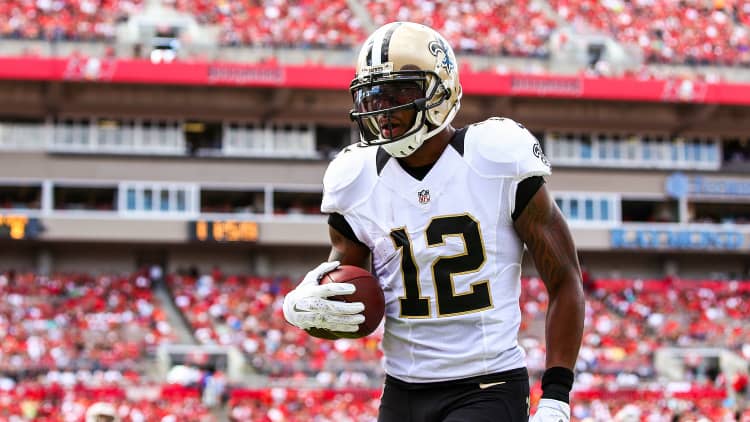Shaquem Griffin is a Seattle Seahawks linebacker who, in 2018, made history as the first one-handed player to be drafted in the NFL.
To prepare for a strong second-year performance in the league, Griffin tells The Wall Street Journal that he followed a strict diet and workout routine during his off-season.
He explains that he and his twin brother and teammate, Shaquill Griffin, worked out five days a week for 90 minutes to two hours, in their hometown of St. Petersburg, Florida.
Three of those days they spent focusing on the upper body, while the other two days were spent focusing on the lower body. On upper body days, the 24-year-old, who had his hand amputated at 4 years old due to a congenital birth defect, says he would wear a prosthetic to do exercises like pull-ups, rows and 225-pound bench presses.
(He doesn't wear the prosthetic when he plays in NFL games, but just for his workouts.)
Some days, he says, he and his brother would go to their father's car towing shop to do tire flips, or to push cars. To recover from their workouts, he says they would get massages twice a week and visit a chiropractor every other week.
In addition to following a strict workout routine, Griffin says he and his brother also hired a chef to help them develop a healthier diet. For breakfast, they would have six egg whites, sweet potatoes, turkey bacon and sausage. After a workout, they would eat a protein bowl filled with brown rice, broccoli and chicken or steak. For lunch or dinner, he says they would eat fish or baked chicken with brown rice and roasted vegetables.
Each day, they would eat four or five smaller meals, rather than three big meals.
"I used to eat whatever I wanted, but I realized food is my fuel and affects my performance and recovery," says Griffin, who admitted that cheesecake is still his "cheat day" item at times.
Though making adjustments to your diet and lifestyle can be difficult, the 24-year-old says having his brother as his workout partner made his process a lot easier. "When one of us gets tired, the other one motivates to get in another rep and push harder," he says. "We keep each other competitive."
In a 2018 essay published by The Players' Tribune, Griffin explained how he and his brother's support for each other dates back to when they were kids. And that wasn't the only family support he received. He writes that growing up, his dad never treated him any differently from his siblings, and he never allowed any of them to make excuses for why they couldn't do something.
He recalls the time when he, his brother Shaquill and their older brother brother Andre would play football in the backyard with their dad.
"We had a couple of stacks of cinder blocks with a stick across the top, like a hurdle," he writes. "And when we would run routes, we would have to jump over the hurdle and do other obstacles mid-route. Then my dad would throw us the ball, and he'd throw it hard, right at our chest. And every time we dropped it, he would say, 'Nothing comes easy.'"
Though Griffin admits that he "hated those workouts," he writes that the three-word motto from his dad, "Nothing comes easy," never allowed him to quit.
"There were definitely times when I wanted to quit," he writes. "Sometimes, when my dad threw the ball so hard that it bounced off my chest or it hit me in the face, I would be like, 'I don't wanna do this anymore.'"
In response, he says, his dad would tell him, "You'll thank me one day."
"At the time, I didn't believe him," he writes. "Now, I understand, and I thank him every chance I get, because all that work in the backyard helped me to develop the mentality that I can handle anything — that whatever you come at me with, I can come back at you even harder."
Like this story? Subscribe to CNBC Make It on YouTube!
Don't miss: First one-handed player drafted into the NFL shares the motto that kept him from quitting



